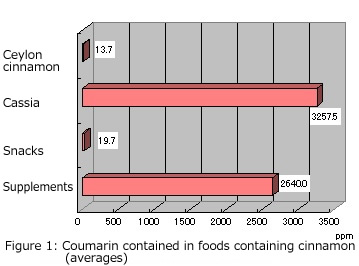Tokyo Food Safety Information Center » Tokyo Metropolitan Government food safety FAQ » Is ingestion of too much cinnamon bad for health?
Is ingestion of too much cinnamon bad for health?

Is ingestion of too much cinnamon bad for health?

-
The amount consumed as a spice or a snack in ordinary meals is not problematic.
-
However, in case of health foods, such as supplements in which the components are enriched higher than ordinary foods, care should be taken against excessive consumption. Observe the recommended daily intake indicated on each product.


< Excessive consumption of coumarin was warned against in Germany.>
- It has been made clear recently that excessive consumption of coumarin, a substance that is one of the odorants of cinnamon, leads to hepatic disorders.
- In Germany, in order to draw attention, the Federal Institute for Risk Assessment (BfR) has defined the tolerable daily intake (intake per day with which no impact is given to health even if a person keeps ingesting that amount for whole his/her life) should be 0.1 mg/kg body weight.
< Result of investigation by Tokyo Metropolitan Government>
- In FY 2007, the Tokyo Metropolitan Government investigated the coumarin contents in food products containing cinnamon spice and cinnamon.
- As a result, as to spices, 13.7 ppm of coumarin was detected from Ceylon cinnamon* and 3257.5 ppm, from cassia* in average (One ppm accounts for detection of one milligram of coumarin from one kilogram of food). Also, 19.7 ppm of coumarin was detected from snacks containing cinnamon and 2640.0 ppm, from supplements.
- From these values, the tolerable intake per day by an adult of body weight of 50 kg is calculated as follows: 364.6 g in case of Ceylon cinnamon, 1.5 g in case of cassia, 253.3 g in case of snacks, and 1.9 g in case of supplements.
- The results of the investigation into Tokyo citizens’ health and nutrition in 2006 indicate that the daily intake of “spices and others” is 0.3 g and that of “snacks” is 28.4 g and thus, most likely cinnamon does not affect health with an ordinary dietary habit.
- As to the supplements, the recommended amount of daily consumption indicated on every product was two capsules, with which the tolerable daily intake of coumarin was not exceeded.
* The plants from which cinnamon is produced are mainly two types: Ceylon cinnamon and cassia. Their bark is used as spices and it is said that Ceylon cinnamon produces more exquisite aroma and thus is of a higher class.
<To business operators>
- When dealing with a supplement product containing cinnamon, set an intake target by considering the tolerable daily intake of coumarin defined by the Federal Institute for Risk Assessment in Germany, and provide consumers with information to prevent excessive consumption.